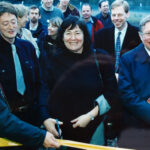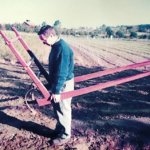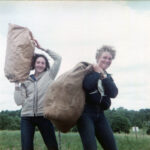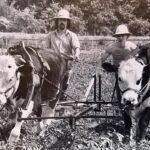My career after the degree in Development Studies focused on education in a range of contexts. Something that links development and education is the concept of change. The relationship between education and change is reflected in one of my favourite quotations from the work of Gregory Bateson in his book Steps to an Ecology of Mind (University of Chicago Press, 1972): “The word ‘learning’ undoubtedly denotes change of some kind. To say what kind of change is a delicate matter.” A central theme in my work has been the role of education in achieving change towards a more ecologically sustainable world.
The fact that the School of Development Studies incorporated the Overseas Development Group, bringing a practical and applied aspect alongside the academic work of the School, was something that attracted me to the degree in Development Studies. Although I was less aware of it at the time, the applied aspects of the course, along with the fact that it crossed several disciplinary boundaries, influenced my view of education through my subsequent PGCE in Geography and Biology and beyond into my teaching career. It was my practical experience in agricultural along with my academic qualifications that singled me out for interview for my first teaching post at a rural comprehensive school in the mid-1980s, where each student grew a three course rotation on their own small allotment during their second year/year 8. I drew heavily on my degree in Development Studies as I had the freedom to develop a new course for year 9 students covering issues such as global resource use, demography, and global warming. In GCSE Geography I was able to steer the department to adopt new options such as human welfare and at ‘A’ level we followed the innovative London Exam Board 16-19 Project, which embraced key debates in development. I also had the opportunity to attend in-service training courses on Global Education delivered by the Centre of Global Education from York University, which expanded my perspectives on values education, human rights education and education through and for the environment. Many initiatives in these fields were supported by NGOs and the network of development education centres such as DEED (Development Education East Dorset) where I became a member of the management committee. It was during this time the Brundtland Report was published, which brought the term ‘sustainable development’ to the fore.
My teaching experience built on the perspectives I had gained in Dev and contributed to a view of education which I was to set out many years later in a professional development document for teachers published by WWF-UK. I was on a journey that would lead me into the field of ESD (education for sustainable development), also referred to as education for sustainability or learning for sustainability. However, by 1990 school education in England and Wales was taking a very different direction with the implementation of the National Curriculum. This centralised curriculum removed the influence of local education authorities and restricted the freedom of teachers to make professional decisions in relation to content and pedagogy. A lot of what was good in schools was swept away and replaced by a reductionist curriculum with overladen content in reinforced subject silos. Promoting a systems thinking approach to redress the balance away from reductionist thinking would become a common theme in my teaching, while always acknowledging that ultimately we need both, as emphasised by Donella Meadows.
The National Curriculum removed aspects of school education that were important for students to develop a holistic worldview. There were attempts to challenge this at local authority level. The LEA in which I worked created several advisory teacher posts to support schools in the non-statutory areas of the curriculum including the post of Advisory Teacher for Political and International Understanding, to which I was appointed in 1990. It was a case of working with pockets of resistance in the face of the juggernaut that was the National Curriculum. When I was faced with having to attend the newly developed Ofsted training course, which was based on a view of education considerably different to my own, I decided to move into Further Education (FE).
FE is sometimes seen as the ‘Cinderella sector’ of education compared to schools and to Higher Education (HE). It is arguably less well funded and receives less political attention. Regardless of this I hold a view that it is an important sector when it comes to change towards sustainable development. The students in FE colleges are incredibly diverse in terms of age and background. The levels of study and the subject areas both span wide ranges with opportunities to cross disciplinary boundaries. FE colleges tend to be rooted in their communities with links to both third sector and business organisations, while also looking to expand the worldview of students. My views on the potential of FE to be important in contributing to sustainable development led me to focus on the sector for my PhD research many years later. However, it was while I was teaching in FE that I spotted a part time MSc course in Environmental and Development Education (the name later changed to Education for Sustainability). It leapt out at me because the content overlapped and built on my Development Studies degree course. The course was a response to the first Earth Summit in 1992 and in particular to Chapter 36 of Agenda 21. Unusually the course was developed by staff from WWF-UK, Oxfam and Intermediate Technology Group among others, who, having written the course, had to then find a university home for it, which turned out to be London South Bank University. I completed the course over three years during which time I worked with staff and students across the college to develop the first sustainable development policy to be adopted by an FE college.
Now focused on education as a vehicle for change towards sustainable development I moved outside the limitations of the formal sectors of education to take up the post of head of education at a large Millennium Project promoting the concept of sustainable development. I had the opportunity to work with architects who were to be later recognised as leaders in the field of sustainable architecture. For example, I came to appreciate the pedagogy of buildings, which I had previously read about in the work of David Orr at Oberlin College, but did not fully experience it until Bill Dunster, who had recently completed BedZed in Sutton, South London, arrived to build a state-of-the-art conference centre out of mainly recycled materials.
I have long argued against the simple notion that if we educated the younger generation about moving the world towards a sustainable future, then change will happen as they become the next generation of decision-makers. Learning needs to take place across all ages and sectors of society to achieve the changes required. As head of education at the Earth Centre Millennium Project I had the opportunity to develop learning strategies for communicating the concept of sustainable development to the general public, businesses, NGOs, schools, colleges and universities. This brought me into contact with a range of individuals and organisations, which proved useful for taking the next step on my career journey.
After four years at the Earth Centre I was able to establish myself as an independent consultant working in areas where sustainable development and education combined. This led to twenty years of contracts and project work ranging from creating continuing professional development programmes for teachers and professional bodies in engineering, construction and management to writing guidance for schools and colleges on Education for Sustainable Development and Global Citizenship for the Welsh Government. Alongside this consultancy work I became a part time tutor on the MSc in Education for Sustainability at London South Bank University that I had completed a few years earlier, and in 2005 I accepted a 0.5 position as co-course director for three years. It was during this time that things came full circle in the sense that I recruited one of my former lecturers from the School of Development Studies to join the tutor team.
The MSc course started in 1994 as a distance learning course with readings and coursework sent by post to a mainly UK student body. By 2005 half the students were overseas in some remote locations and email had become an important means of communication. During my tenure as course director the course moved online, first to a bespoke website and then to a VLE, by which time the majority of students were outside the UK. Towards the end of my time as course director we were successful in receiving Commonwealth Scholarship Commission scholarships for students from African Commonwealth countries for the three year distance learning programme. This meant that students who normally would not be able to fund their MSc had an opportunity to join the course. Two major themes of the course were linking theory to practice and developing agents for change. As well as presenting appropriate academic qualifications, applicants for the scholarships had to demonstrate how following the MSc course could provide development impact in their home country. For the first round of 23 scholarships, we received over 600 applications. In an unprecedented run for the Commonwealth Scholarships Commission, we continued to receive 10 to 15 scholarships each year for ten years in addition to the self-funding students. The scholarship funding also enabled the course to provide a week-long residential workshop each October, for all scholarship students and any others who could attend. The workshop was held in the country with the largest number of scholarship students enrolled during that year and travel costs were provided for the other scholarship students. Venues included South Africa, Kenya and Uganda. The outcome from the MSc course as a whole is that there are alumni from the course now holding decision-making posts and contributing to change in NGOs, schools and universities, national government ministries and United Nations agencies in countries around the world.
My association with the course finished in August 2022 and this coincided with me finishing my paid consultancy work. For the last ten years I have been a trustee and latterly the chair of the Shared Earth Trust, which is a voluntary position. The Shared Earth Trust is a charity that runs a former 40 acre agricultural holding that has been converted into a nature reserve demonstrating the promotion of biodiversity and an education centre with residential accommodation. The centre provides courses and events in ecology, permaculture, traditional crafts and sustainable living, allowing me some opportunities to still draw on my educational experiences and contribute to practical changes towards addressing the climate and ecological emergency.
My learning journey has been influenced by all the experiences referenced here and many others besides. But the three years spent in the School of Development Studies made a significant contribution and provided numerous signposts on my journey, which I am still following.
Glenn Strachan
September 2023







Leave a Reply